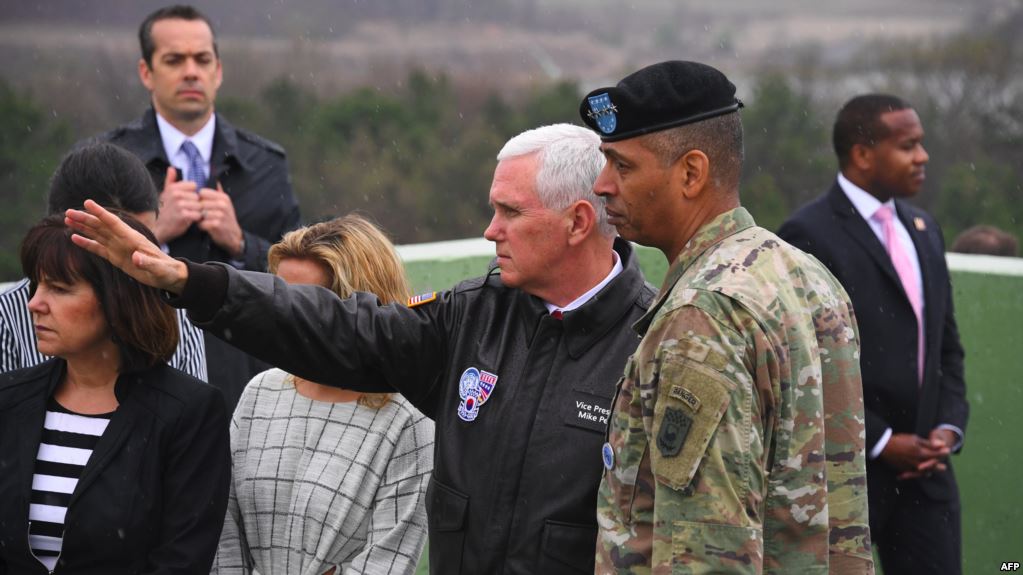Special to WorldTribune.com
Radio Free Europe / Radio Liberty
U.S. Vice President Mike Pence warned North Korea not to test President Donald Trump’s resolve, saying that “all options are on the table” in curbing Pyongyang’s missile and nuclear weapons programs.

Pence said during a press conference in Seoul on April 17 that recent U.S. military action in Syria and Afghanistan had signaled the “strength and resolve of our new president.”
“North Korea would do well not to test his resolve, or the strength of the armed forces of the United States in this region,” Pence said during a joint press conference with South Korea’s acting President Hwang Kyo-Ahn.
The U.S. military this month struck a Syrian airfield with 59 cruise missiles. On April 13, the U.S. military said it had dropped the largest nonnuclear bomb it has ever used in combat, on Islamic State (IS) group hideouts in eastern Afghanistan.
Pence’s remarks stirred a warning from Russia against the launch of a unilateral strike on North Korea.
“This is a very risky path,” Russian Foreign Minister Sergei Lavrov said at a news conference in Moscow on April 17. “We do not accept the reckless nuclear missile actions of Pyongyang that breach UN resolutions, but that does not mean that you can break international law.
“I hope that there will not be any unilateral actions like the one we saw recently in Syria.”
Earlier, Pence visited the highly fortified Korean demilitarized zone (DMZ) and the border village of Panmunjom and said the “era of strategic patience” with North Korea is over.
Pence said on April 17 during his visit to the Panmunjom truce village that Washington wants to proceed “through peaceable means, through negotiations.”
“But all options are on the table as we continue to stand shoulder to shoulder with the people of South Korea,” he added.
Speaking at Freedom House a few meters from the military demarcation line, Pence said, “The people of North Korea, the military of North Korea, should not mistake the resolve of the United States of America to stand with our allies.”
Pence’s visit to the border between North and South Korea comes as tensions on the peninsula have risen substantially over Pyongyang’s missile program.
It also comes a day after the North attempted to test-fire a missile that exploded almost immediately after launch.
Pence is on a 10-day, four-nation tour of Asia. He will visit key U.S. ally Japan, which has also condemned North Korea’s missile program that has included at least six nuclear tests, along with Indonesia and Australia.
Pence arrived by helicopter at Camp Bonifas, a U.S.-led United Nations post just outside the DMZ, for a briefing with military leaders and to meet with U.S. troops stationed there.
“It is particularly humbling for me to be here,” he said to a group of soldiers and others.
“My father served in the Korean war with the U.S. Army, and on the way here we actually saw some of the terrain [where] my father fought alongside Korean forces to help earn your freedom.”
Earlier, Pence called North Korea’s failed missile launch a “provocation.”
“This morning’s provocation from the North is just the latest reminder of the risks each one of you face every day in the defense of the freedom of the people of South Korea and the defense of America in this part of the world,” Pence told soldiers at a U.S. base earlier in the day.
Amid elevated tensions, the United States has dispatched what Trump called an “armada” of ships — including an aircraft carrier — into waters off the Korean Peninsula.
Trump in an April 16 tweet said that China is working with the United States on the “North Korea problem.”
A White House adviser on the Pence trip said that the United States was unlikely to respond to the North’s latest missile test because there was no need to reinforce the failure.
North and South Korea are technically still at war after their 1950-53 conflict ended without an official peace treaty. The U.S. military has about 28,500 troops stationed in South Korea.
